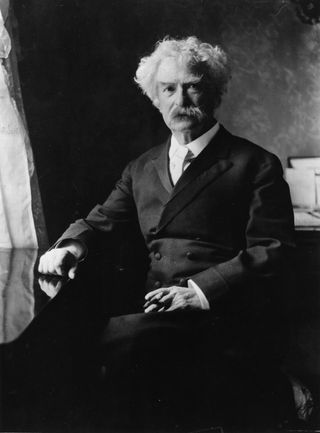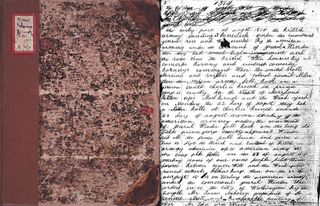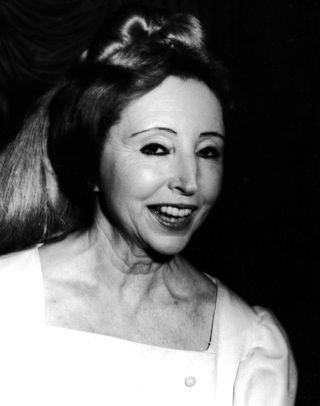'Dear Diary': 14 Noteworthy Journal-Keepers
Mark Twain (1835-1910)

Samuel Langhorne Clemens, more commonly known under the pen name of Mark Twain, used humor and colloquial language to craft popular stories about fictional characters and to document his own travels. From the age of nineteen, he kept notebooks where he recorded lessons, reminders and observations; his journals were later published in three volumes spanning the years 1855 through 1891, by the University of California Press.
Over decades, Twain's journal entries track his literary triumphs and tribulations, his forays into publishing and business (and his subsequent bankruptcy), and his musings on historic events.
Michael Shiner (1805-1880)

African American Michael Shiner, who meticulously chronicled his years working at the Washington U.S. Navy Yard from 1813 to 1869, was born a slave in Maryland and was freed in 1840. He had little formal education, leaning to read and write at a Sunday school established for African Americans at the First Presbyterian Church of Washington, according to the Naval History and Heritage Command (NHHC), an archival institution for the U.S. Navy.
In his journal, which he referred to as his "book," Shiner recorded the names of ships that were built or docked at the Navy yard, and reported anecdotal details about his co-workers, fires and accidents on the job, and visits from dignitaries, including several U.S. presidents. But Shiner also wrote about the harsh realities of life for African Americans at the time, including the 1833 kidnapping of his wife and daughters by slave dealers, and how he tracked them down and brought them home. He also documented a labor strike at the yard in 1835 that exploded into a race riot, with white mobs attacking black schools, businesses and churches.
The manuscript of Shiner's journal — 186 numbered pages — is transcribed and annotated on the NHHC website.
Anaïs Nin (1903-1977)

French writer Anaïs Nin began keeping a diary in 1914 at the age of 11, but her intensely personal memoirs — which during her adult years were unabashedly erotic — didn't find an appreciative audience until she was 63. Versions of her diaries spanning seven volumes and covering nearly half a century of her life were published beginning in 1966, and her frank discussions of sex, extramarital affairs and abortions bolstered her reputation as a feminist icon, the Guardian reported in 2015.
"The secret of a full life is to live and relate to others as if they might not be there tomorrow, as if you might not be there tomorrow," Nin wrote in a May 1946 entry.
Sign up for the Live Science daily newsletter now
Get the world’s most fascinating discoveries delivered straight to your inbox.
"It eliminates the vice of procrastination, the sin of postponement, failed communications, failed communions. This thought has made me more and more attentive to all encounters, meetings, introductions, which might contain the seed of depth that might be carelessly overlooked."
Peggy Whitson (b. 1960)

NASA astronaut and biochemist Peggy Whitson has twice served as the commander of the International Space Station (ISS), and has accrued over 534 days in space — more than any other American. The journals she kept while onboard the ISS, archived online by NASA, report on the astronauts' daily routines, from technical responsibilities to whimsical descriptions of the condiments they used on their food.
"Our crew motto is, 'It’s all about the sauce.' We have salsa, hot sauce, hot pepper sauce, sun-dried tomato paste, pesto paste, olive oil, catsup-like sauces, horseradish sauce, mayonnaise, BBQ sauce, mustards of various types," Whitson wrote during the 16th expedition to the ISS Expedition, which took place from October 10, 2007 to April 19, 2008.
"They come in plastic bottles and squeeze tubes. A common question at lunch/dinner is 'What are you having with your sauce today?' Last night, I was giving Yuri a hard time. He was squeezing out the last few bits of a paste from one of the squeeze tubes directly into his mouth. I told him that was taking our motto, 'It’s all about the sauce,' to the limit!"

Mindy Weisberger is an editor at Scholastic and a former Live Science channel editor and senior writer. She has reported on general science, covering climate change, paleontology, biology and space. Mindy studied film at Columbia University; prior to Live Science she produced, wrote and directed media for the American Museum of Natural History in New York City. Her videos about dinosaurs, astrophysics, biodiversity and evolution appear in museums and science centers worldwide, earning awards such as the CINE Golden Eagle and the Communicator Award of Excellence. Her writing has also appeared in Scientific American, The Washington Post and How It Works Magazine. Her book "Rise of the Zombie Bugs: The Surprising Science of Parasitic Mind Control" will be published in spring 2025 by Johns Hopkins University Press.











